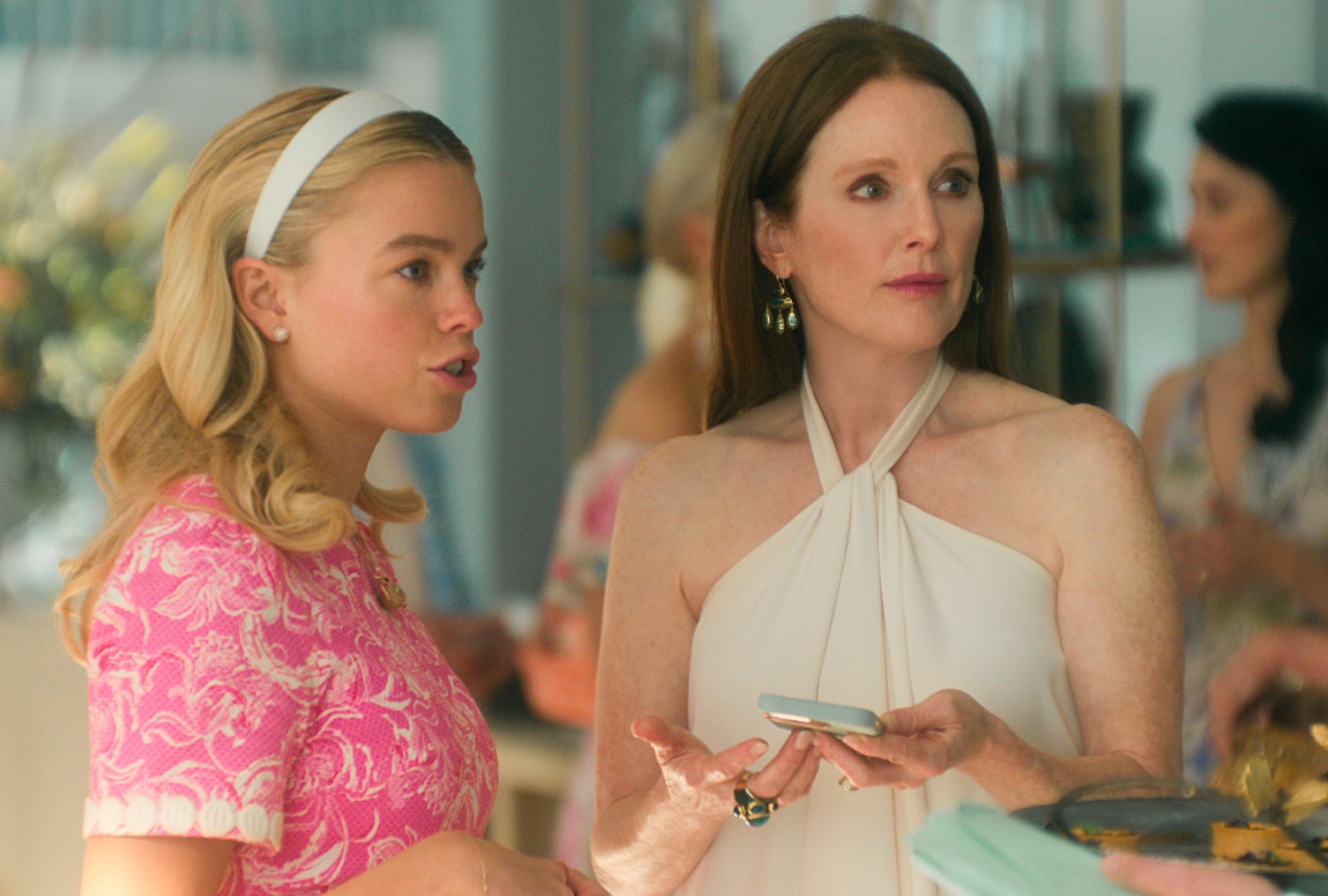“Dynasty,” the 1981 version, opens with sweeping God’s-eye views of mountains, a forested estate and construction workers building temples to industry — all that the show's protagonist, Blake Carrington, lords over. Our first glimpse of Carrington shows him at work in his massive study. We meet his wife-to-be and former secretary, Krystle, at her bachelorette party taking place inside her modest apartment.
Blake has his driver drop off a pair of whoppingly huge diamond earrings, just because. Before she opens the velvet box, a friend blithely mentions that the closest she’s gotten to Krystle’s future husband was when his limo drove through a picket line. She says this with a sense of awe, marveling at how much closer Krystle will be to this wonderful, romantic overlord.
More than four decades and several Kardashian spinoffs later, “Dynasty” is an adorable throwback, and the Carringtons' $200 million fortune is laughable. Today’s titans make that by simply breathing. No joke: In 2024, Yahoo Finance placed Jeff Bezos’ average hourly earnings at around $8 million, dependent on the fluctuating value of Amazon stock.
Wealth’s visual signifiers have transformed, too. These days, the rich try to blend in with the rest of us poors. In “Sirens,” the billionaire lord of the Cliff House, Peter Kell (Kevin Bacon), enjoys relaxed button-down shirts, smoking joints and hanging with the help.
 Julianne Moore as Michaela and Kevin Bacon as Peter Kell in "Sirens" (Macall Polay/Netflix)
Julianne Moore as Michaela and Kevin Bacon as Peter Kell in "Sirens" (Macall Polay/Netflix)
Peter's wife, Michaela (Julianne Moore), is a stylistic contrast, gliding through the property in draping fashions suited to the goddess she’s styled herself to be. Michaela, who goes by the pet name Kiki, brushes each interaction with a positive affirmation and a smile, leaving it to her assistant Simone (Milly Alcock) to execute her wishes with fierce pecking and claw swipes.
In the Kells' seaside domain, the world bends to Michaela’s will. Peter is nowhere to be found when the story begins, but Kiki’s hangers-on are in full force, addressing her in unison and uniformly singing her praises. Simone is right there with them.
When Simone's foul-mouthed sister Devon (Meghann Fahy) shows up at the residence's front door without notice, Simone immediately shifts into triage mode. Devon is a wreck with two DUIs and a sex addiction — coping mechanisms she developed to dull the ache of being broke, desperate and saddled with a father (Bill Camp) who is sliding into dementia.
 Meghann Fahy as Devon in "Sirens" (Macall Polay/Netflix)But Simone is less concerned about all that than how her sister looks. Devon's a disheveled, sweaty wreck storming the gates of the Kells’ orderly Elysium precisely when Michaela’s garden party is kicking off, the first of several she's planned for that weekend. She’s a remnant of a déclassé life that Simone wants to leave behind.
Meghann Fahy as Devon in "Sirens" (Macall Polay/Netflix)But Simone is less concerned about all that than how her sister looks. Devon's a disheveled, sweaty wreck storming the gates of the Kells’ orderly Elysium precisely when Michaela’s garden party is kicking off, the first of several she's planned for that weekend. She’s a remnant of a déclassé life that Simone wants to leave behind.
The title of "Sirens" refers to Devon and Simone's version of an SOS and, of course, it also evokes the mythical figures famous for luring sailors to their deaths with their otherworldly voices. Devon believes she can see through the pretty waves obscuring deadly rocks in her sister's path because she assumes rich people are exploitative. When a drunk townie intimates that Michaela murdered the first Mrs. Kell, Devon believes her.
The simple precision of Fran Lebowitz describing Donald Trump as “a poor person’s idea of a rich person” conjures the president’s addiction to tacky, gilded décor in eight words. But ideas are bigger than one tasteless lug with a thing for golden toilets. They’re a broad tapestry made out of thousands of messages and images.
Modern ideas of wealth are simultaneously ostentatious and low-key. Not long ago, owning a sprawling suburban mansion showed the world that you’ve made it. Nowadays, real money walls itself off from the disgruntled 99%.
Lebowitz’s quote instantly calls to mind countless small-screen depictions of the gaudy excess that '80s-era primetime soaps like "Dynasty" sold us. “Sirens” updates that collage portrait, casting the modern billionaire not as gauche but reserved, a misunderstood figure we should trust.
Showrunner Molly Smith Metzler adapted the five-episode limited series from her 2011 play “Elemeno Pea,” which views class warfare through the green glasses of Devon’s envy. For her Netflix version, Smith Metzler tweaks the plot to toy with our unconscious ideas of upper-class power dynamics.
 Milly Alcock as Simone and Julianne Moore as Michaela in "Sirens" (Netflix). It's Michaela, not Peter, who holds the community’s moneyed congregation in the palm of her hand. Her cadre of worshippers assigns to her a mystical power to transform lives, but the truth is mundane. Michaela once had a thriving career in law until she met Peter. He persuaded her, a professional persuader, to surrender her career to be his full-time mate. In exchange, he surrenders his first marriage.
Milly Alcock as Simone and Julianne Moore as Michaela in "Sirens" (Netflix). It's Michaela, not Peter, who holds the community’s moneyed congregation in the palm of her hand. Her cadre of worshippers assigns to her a mystical power to transform lives, but the truth is mundane. Michaela once had a thriving career in law until she met Peter. He persuaded her, a professional persuader, to surrender her career to be his full-time mate. In exchange, he surrenders his first marriage.
The perks of being Mrs. Kell are substantial. There’s endless money, the management of a stunning coastal property and the ability to devote days to her passion for rescuing injured raptors. Everyone wants to know Kiki. Only Simone is convinced that she does.
Peter, meanwhile, tries to project regular guy normalcy despite being born to money. It’s his wife who thinks she’s too good for everyone else, you see.
Modern ideas of wealth are simultaneously ostentatious and low-key. Not long ago, owning a sprawling suburban mansion showed the world that you’ve made it. Nowadays, real money walls itself off from the disgruntled 99% with compounds that, like Cliff House, are only accessible by inconvenient transport like ferries, helicopters or private planes.
 Julianne Moore as Michaela "Kiki" Kell in "Sirens" (Macall Polay/Netflix)If you’re someone like Elon Musk, creating a bespoke community made up of you and your family is the dream. Musk envisions his Austin, Texas villa and surrounding acres as a place to house the wombs that have borne his 11 (at least) children, enabling him to (theoretically) spend time with them efficiently. Rich men can afford to support lots of progeny they never have to see.
Julianne Moore as Michaela "Kiki" Kell in "Sirens" (Macall Polay/Netflix)If you’re someone like Elon Musk, creating a bespoke community made up of you and your family is the dream. Musk envisions his Austin, Texas villa and surrounding acres as a place to house the wombs that have borne his 11 (at least) children, enabling him to (theoretically) spend time with them efficiently. Rich men can afford to support lots of progeny they never have to see.
Michaela has no children. Instead, she transforms the Kells’ estate into a nature preserve where she hosts opulent galas and nurses injured hawks. But Michaela’s true charity work involves rehabbing lost people like Simone, a young woman who attended Yale on a scholarship, dropped out of law school and comes to devote herself to Kiki. Simone is also a Trojan Horse. If Michaela hadn’t opened her home to her, Devon and their dad would never have invaded their exclusive peace.
We need your help to stay independent
“Sirens” is a simple story that distracts the audience from recognizing the real villain, if we even choose one. It unfolds along the same lines as “The Perfect Couple” and “Nine Perfect Strangers,” both of which feature Nicole Kidman playing patrician enigmas — a trend that began with her turn in "Big Little Lies." Fahy also appears in “The Perfect Couple” and the second season of “The White Lotus,” which have in common the overt takeaway that the rich cannot buy their way out of misery.
Subconsciously, these shows coax us into accepting certain inhumane behaviors as the inevitable spoils of being part of the 1%. The White Lotus resort chain attracts horrible people. The family in “The Perfect Couple” is unbearably selfish.
“Sirens” is a simple story that distracts the audience from recognizing the real villain, if we even choose one.
The Kells’ staff despise their boss and barely hide their disdain for Simone even as they fulfill each ridiculous command to the tiniest detail. But as Simone conveys to Devon, Michaela’s world is a paradisical bubble. She and the staff could find less demanding work, but why? The world beyond Cliff House is so ugly.
One of the surest ways modern billionaires distinguish themselves from the rest of us is by routinely trading their wives for fresher models. It’s an old cliché that never goes out of style, along with the assumption that the new wife has it better.
But as reports about actual rich people divorcing show, nobody is safe from being cast out from Olympus. The cult of wealth makes people interchangeable, women especially. Rupert Murdoch famously ditched his fourth wife, Jerry Hall, via email. (“Jerry, sadly, I’ve decided to call an end to our marriage,” his breakup note allegedly read. “We have certainly had some good times, but I have much to do.”)
Whenever the public deems to think about these things, it’s rarely the ex-wives who are celebrated. Bezos’ first wife, MacKenzie Scott, may be an exception, a perk of emerging from her divorce as one of the wealthiest people on the planet. Then again, she didn’t star in a highly publicized and produced trip into space, a reward Bezos gifted to his fiancée, Lauren Sánchez.
Start your day with essential news from Salon. Sign up for our free morning newsletter, Crash Course.
Kiki’s fatal mistake, besides failing to pop out a baby, was demanding that Peter cut off contact with the kids from his first marriage because they hate her. At least, that’s what one of the world’s richest men says — a guy who flies around the globe and has a reputation for exercising substantial power in all other matters.
Ancient myths are rife with stories of gods sacrificing scapegoats to maintain their rank in the divine order. Peter reminds us of his place by erasing Michaela’s social identity in the time it takes for Simone to change into her silver gown.
 Meghann Fahy as Devon and Kevin Bacon as Peter Kell in "Sirens" (Netflix)“Don’t you look beautiful in that dress I had made for you?” Michaela whispers moments before she’s replaced, mid-party. Their confrontation takes place in the kitchen, that supposedly wifely domain.
Meghann Fahy as Devon and Kevin Bacon as Peter Kell in "Sirens" (Netflix)“Don’t you look beautiful in that dress I had made for you?” Michaela whispers moments before she’s replaced, mid-party. Their confrontation takes place in the kitchen, that supposedly wifely domain.
This final turn is less consoling or condemnatory than darkly revealing about our assumptions about Michaela, who's portrayed as a controlling fury for most of the story. But in the end, who doesn’t deserve what they get? Peter presents himself as a simple man who only wants the golden life he has the means to fund. Simone demonstrates enough loyalty to win him to her side.
But it's Peter who assigns Michaela and Simone their status and always holds the power to elevate or ruin them. At least the staff never has any illusions about where they stand. Yet so many of the people watching still do.
One day, any of us could be in their position, whispers this fantasy, and who is to say we’d behave any differently? Maybe this explains why a plurality of Americans embrace this modern poor man's idea of rich men, agreeing when they declare they’ve earned the life they construct around them, including the right to make others pay for it.
"Sirens" is now streaming on Netflix.
Read more
about rich people on TV


